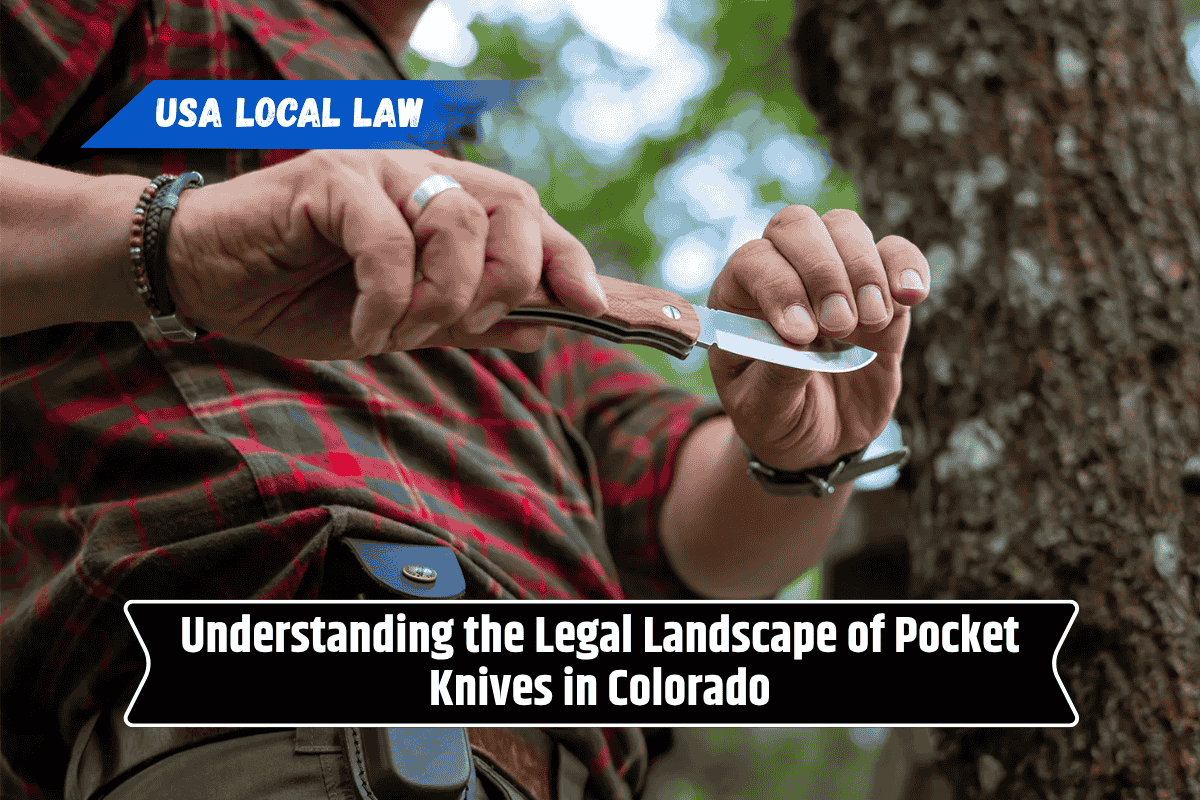Pocket knives are useful tools that many people carry every day. Whether it’s for opening packages, outdoor use, or personal safety, pocket knives are common across Colorado.
But before you slip one into your pocket, it’s important to know what’s legal and what’s not. Colorado has specific laws about knife ownership and carrying, especially when it comes to blade size, concealed carry, and restricted places.
Let’s explore what Colorado law says about carrying pocket knives and what rules you need to follow to stay out of trouble.
Are Pocket Knives Legal in Colorado?
Yes, pocket knives are generally legal in Colorado. In fact, most types of knives are legal to own and carry — but there are some restrictions, especially related to how long the blade is and whether the knife is visible or hidden (concealed).
The main thing to remember is: blade length matters, and concealed carry rules apply.
Blade Length: The 3.5-Inch Rule
Under Colorado law, if you carry a knife with a blade longer than 3.5 inches, it can be considered illegal if it is concealed — unless you have a valid reason, like hunting, fishing, or your job requires it.
If the blade is 3.5 inches or shorter, you can carry it openly or concealed, and it’s usually legal in most public areas.
So, carrying a small folding knife or pocket knife (with a blade under 3.5 inches) is legal, even in your pocket, as long as you are not using it for illegal purposes.
What Is Considered a Concealed Knife?
A knife is concealed if it’s hidden from plain view — like in your pocket, boot, or under clothing. Colorado law treats concealed knives with longer blades (over 3.5 inches) more seriously, especially if carried in public without a lawful reason.
This rule mainly applies to fixed-blade knives, large folding knives, and tactical knives.
What Types of Knives Are Legal?
In Colorado, most common knives are legal to own and carry. These include:
Pocket knives
Folding knives
Utility knives
Hunting knives
Kitchen knives (when transported properly)
Even switchblades and gravity knives used to be banned, but as of 2017, Colorado made them legal to possess and carry, unless banned locally.
Where Are Knives Restricted?
Even if your knife is legal, there are some places in Colorado where carrying any kind of knife can be illegal, such as:
Schools (K-12): No knives allowed on school property, including parking lots and buses. This includes students and adults.
Government buildings: Many courthouses and municipal buildings do not allow any weapons, including knives.
Airports: TSA rules ban knives of any size from carry-on luggage.
Private property: If a business posts a “no weapons” sign, you must follow that rule — or you could be asked to leave or face trespassing charges.
What Happens If You Break the Knife Law?
If you’re caught carrying a concealed knife with a blade over 3.5 inches without a valid reason, you may be charged with a misdemeanor under Colorado law. Penalties can include:
A fine
Confiscation of the knife
Possible jail time (in serious cases or repeat offenses)
Police may also consider how you use or intend to use the knife, so even a legal knife can become a legal issue if used in a threatening or violent way.
Do Local Laws Vary?
Yes. While Colorado has state laws, some cities and counties have stricter local laws. For example:
Denver once had stricter knife laws, but in 2022, they were changed to match state law. Still, always check your local city ordinances before carrying a knife, especially if you’re traveling.
Can Minors Carry Pocket Knives?
There is no statewide age restriction for carrying legal pocket knives, but schools strictly ban all weapons, including knives — even for students who carry them by mistake. Parents should make sure children understand the rules and avoid bringing knives to school or public events.
Pocket knives are legal in Colorado, but only if you follow a few simple rules. As long as the blade is 3.5 inches or shorter, and you’re not carrying it in a restricted place or using it dangerously, you’re usually within the law. Larger knives must not be carried concealed unless you have a lawful reason.
To stay safe and legal, always check the blade length, keep the knife visible if required, and avoid bringing knives into schools or government buildings. Knowing the rules helps you avoid trouble and stay prepared without risking legal problems.
